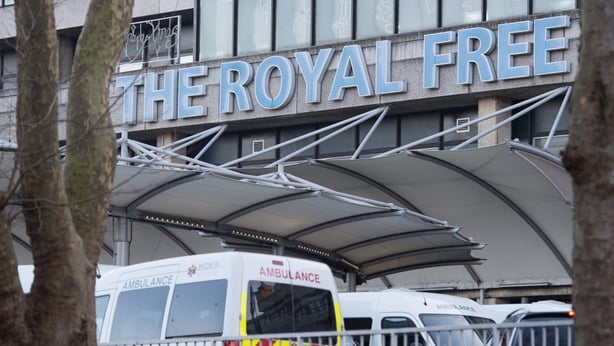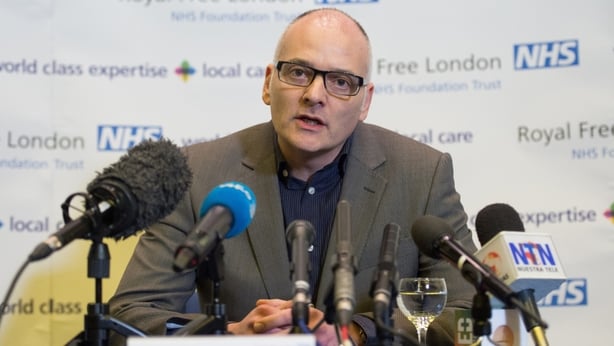The doctor treating a Scottish nurse who contracted Ebola in Sierra Leone has said she has agreed to be given an experimental anti-viral drug, which is not proven to work.
Pauline Cafferkey is also being treated with convalescent plasma taken from the blood of a recovered Ebola patient.
She was diagnosed with Ebola after returning to Scotland on Sunday, after working in the west African country for five weeks.
Ms Cafferkey, a public health nurse at Blantyre Health Centre in South Lanarkshire, is receiving specialist treatment via a quarantine tent at the Royal Free Hospital in London.

Infectious Disease Consultant Dr Michael Jacobs said she was sitting up and talking, and had been visited by her family.
He pointed out it was very early in the illness and he did not wish to give an opinion on the probable outcome of the treatment.
Dr Jacobs said: "At the moment, we don't know what the best treatment strategies are. That's why we're calling them experimental treatments.

"As we've explained to Pauline, we can't be as confident as we would like.
"There's obviously very good reason to believe it's going to help her, otherwise we wouldn't be using it at all, but we simply don't have enough information to that's the case.
"The one thing I'll say about the drug - it has been used extensively in people previously for different reasons, and it has a very good safety record in humans which has encouraged us to use it in this experimental way."
Dr Jacobs said the hospital was unable to obtain ZMapp, the drug used to treat another British volunteer nurse, William Pooley, who recovered, because "there is none in the world at the moment".
Dr Jacobs said Ms Cafferkey’s case and the treatment of Mr Pooley earlier this year "were quite separate from one another."
"We're starting from the beginning again," he said. "We're treating Pauline absolutely on her own merits."
Ebola still spreading in west Africa
The Ebola virus is still spreading in west Africa, especially in Sierra Leone, and the number of known cases globally has now exceeded 20,000, the World Health Organisation said.
The death toll from the outbreak, which has been mostly confined to west Africa, has risen to 7,905, the WHO said, following 317 fatalities recorded since it last issued figures on 24 December.
The number of known cases, including fatalities, totalled 20,206 at year-end, it said.
Sierra Leone accounted for 337 of 476 new laboratory-confirmed cases since Christmas Eve.
They included 149 in Freetown, the highest incidence in the capital in four weeks.
The urgent need for assistance in Sierra Leone prompted the United States Agency for International Development to airlift two ambulances to Freetown from Liberia's capital Monrovia, once the worst Ebola hotspot, the United Nations said.
However, the number of cases in Sierra Leone over a three-week period has fallen below 1,000 for the first time since 28 September, suggesting the spread of the disease is slowing.
In neighbouring Guinea, the three-week total rose for a second week to 346, suggesting the epidemic is growing there.
Nine countries have now reported cases of Ebola.
Ebola broke out for the first time in west Africa a year ago when a two-year-old boy died in southern Guinea on 28 December 2013, but the so-called "index case" only came to light in March by which time the disease had spread widely.
Liberia lifted a curfew imposed to curb the spread of Ebola so that people could attend New Year's Eve church services, as Medecins Sans Frontieres warned of growing complacency over the disease in the country.
The haemorrhagic fever, which causes vomiting, diarrhoea and bleeding, is spread by contact with bodily fluids.
It has no known cure but several major drug makers are developing vaccines already being tested in clinical trials.

